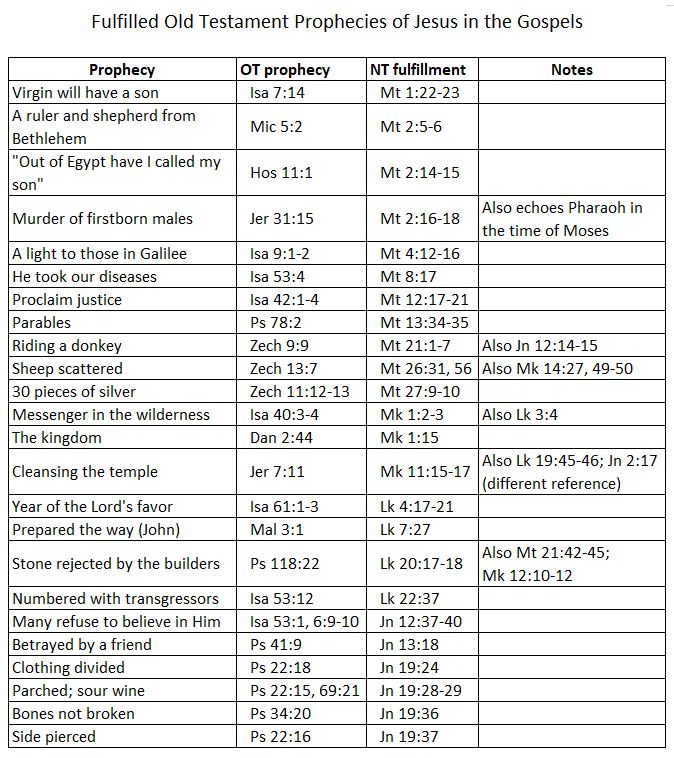In short
Jesus of Nazareth is the Messiah (or Christ) that the Old Testament Scriptures predicted would come. Some predictions are obvious, while others are the complete opposite (to me, anyway).
Why they are important
The New Testament books quote a great many of these prophecies to tell us that they were fulfilled in Jesus, and the sheer number of them is staggering. While our belief is usually associated with the resurrection of Christ and the miracles He did on earth, the prophecies certainly strengthen our belief in Him, too.
Examples
There are easily dozens of New Testament scriptures about Jesus that come right out and say “this fulfilled this prophecy,” and I included many of them in the chart. But as you might expect, there are, by many counts, hundreds more prophecies that are fulfilled but only alluded to.

Theology and doctrine
I can’t explain how important the Old Testament Scriptures were to the men that knew Jesus and those that wrote the gospels and New Testament letters. These prophecies are a neat anecdote to us, but for Jews this would have been the defining event of their generation. They lived through the fulfillment of the Messiah.
What about that statistic that everyone likes to quote?
The odds of one man fulfilling a specific eight prophecies of the messiah are 1 in some astronomical number (1×10^17, is the number)*. That’s the claim.
For all of you guys that want this to be true, I love you all. But please, oh please, stop using this. It just goes to show our collective ignorance about science or math. I feel like I am explaining something from Snopes.com.
I can tell you from a background of a LOT of math**, that this number is utterly fabricated and no one of any reputation would endorse the logic behind it. He picks completely arbitrary examples of “what are the odds of” and then assigns them odds and then multiplies those odds together.
- First problem: that’s pure guessing. Some things are REALLY ludicrous to even claim there are odds. (What are the “odds” of a virgin birth [around 1 BC]? Umm, literally zero, guys!)
- The second problem is that he assumes (if he even knows that he is doing this) that the prophecies are mutually exclusive. That’s not fair.
For example, what are the odds of someone with the first name Maria having the last name Rodriguez? Actually, they are pretty good, compared to being named Pierre Rodriguez, for example. Hispanic people are way more likely to pick a Hispanic first name than some WASPy first name. Duh, right? (See the linked*** article for a really neat explanation of this.) You can’t just haphazardly multiply the odds together of first names vs. last names to get the number. Real life isn’t utterly random. So, the odds of being both from Bethlehem AND from the line of David are not that far-fetched, you know? It’s David’s hometown.
What’s the point in all of this tearing down this “scientific analysis”? Well, I really, really hate when Christians put their faith in really, really bad logic or evidence or research. There are legitimate, reputable ways to attest to the Bible’s amazingness. Why do we turn to this one instead?
The fulfilled prophecies of Jesus are INCREDIBLE. That’s enough. Don’t try to use pseudoscience to put a number on it.
Footnotes
* A book from around 1952 called “Science Speaks” puts forth the calculation; I found the text of the argument here: https://www.bereanpublishers.com/the-odds-of-eight-messianic-prophecies-coming-true/. The author is someone named Peter Stoner, who is co-founder of some society of Christians called the American Scientific Affiliation.
As further proof, some try to quote Peter Stoner’s boss, H. Harold Hartzler, who was the first director of the American Scientific Affiliation, and he says Stoner’s work is perfectly sound. Well, there’s an independent judge! Come on, guys. For example, https://nickcady.org/tag/peter-stoner/
** I’m a software developer with a degree in engineering, and I have taken (and passed) math classes through Calculus 3, differential equations, linear algebra, statistics, and I deal with a ton of accounting as an ERP administrator and honorary business analyst. Yes, I’ll put my math skills against this myth any day.
*** https://fivethirtyeight.com/features/whats-the-most-common-name-in-america/

No responses yet